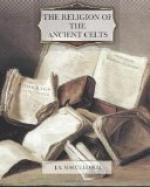Although no complete account of the end of all things, like that of the Scandinavian Ragnarok, has survived, scattered hints tell of its former existence. Strabo says that the Druids taught that “fire and water must one day prevail”—an evident belief in some final cataclysm.[785] This is also hinted at in the words of certain Gauls to Alexander, telling him that what they feared most of all was the fall of the heavens upon their heads.[786] In other words, they feared what would be the signal of the end of all things. On Irish ground the words of Conchobar may refer to this. He announced that he would rescue the captives and spoil taken by Medb, unless the heavens fell, and the earth burst open, and the sea engulphed all things.[787] Such a myth mingled with Christian beliefs may underlie the prophecy of Badb after Mag-tured regarding the evils to come and the end of the world, and that of Fercertne in the Colloquy of the Two Sages.[788] Both have a curious resemblance to the Sybil’s prophecy of doom in the Voluspa. If the gods themselves were involved in such a catastrophe, it would not be surprising, since in some aspects their immortality depended on their eating and drinking immortal food and drink.[789]
FOOTNOTES:
[766] Avienus, Ora Maritima, 644 f.
[767] IT i. 25; Gaidoz, ZCP i. 27.
[768] Annales de Bretagne, x. 414.
[769] IT i. 50, cf. 184; Folk-Lore, vi. 170.
[770] Caesar, vi. 18.
[771] See p. 341, infra.
[772] Diod. Sic. v. 24; Appian, Illyrica, 2.
[773] Amm. Marcel, xv. 9.
[774] D’Arbois, ii. 262, xii. 220.
[775] Antient Laws of Ireland, i. 23. In one MS. Adam is said to have been created thus—his body of earth, his blood of the sea, his face of the sun, his breath of the wind, etc. This is also found in a Frisian tale (Vigfusson-Powell, Corpus Poet. Bor. i. 479), and both stories present an inversion of well-known myths about the creation of the universe from the members of a giant.
[776] Sebillot, i. 213 f., ii. 6, 7, 72, 97, 176, 327-328. Cf. RC xv. 482, xvi. 152.
[777] Sebillot, ii. 6.
[778] LL 56; Keating, 117, 123.
[779] RC xv. 429, xvi. 277.
[780] See p. 191, supra.
[781] Sebillot, ii. 41 f., 391, 397; see p. 372, infra.
[782] Triads in Loth, ii. 280, 299; Rh[^y]s, HL 583, 663.
[783] RC xvi. 50, 146.
[784] Apoll. iv. 609 f.
[785] Strabo, iv. 4. 4.
[786] Arrian, Anab. i. 4. 7; Strabo, vii. 3. 8. Cf. Jullian, 85.
[787] LL 94; Miss Hull, 205.
[788] RC xii. 111, xxvi. 33.
[789] A possible survival of a world-serpent myth may be found in “Da Derga’s Hostel” (RC xxii. 54), where we hear of Leviathan that surrounds the globe and strikes with his tail to overwhelm the world. But this may be a reflection of Norse myths of the Midgard serpent, sometimes equated with Leviathan.




